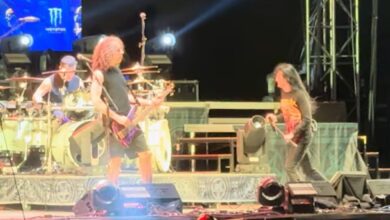Nightwish’s Wacken 2013 “Ghost Love Score” was a symphonic metal highlight with powerful stage presence
Nightwish’s performance of “Ghost Love Score” at Wacken Open Air 2013 is one of the most iconic live renditions by the band. This particular performance was part of their “Showtime, Storytime” concert, which has since become a benchmark for live symphonic metal performances. The energy and emotion displayed during this performance have cemented it as a fan favorite and a significant highlight in Nightwish’s extensive live catalog.
The song “Ghost Love Score” itself is a masterpiece of symphonic metal, known for its epic structure, complex arrangements, and emotional depth. It features powerful orchestral elements combined with heavy metal instrumentation, creating a dramatic and immersive musical experience. The song was originally released on Nightwish’s 2004 album “Once,” which marked a significant evolution in the band’s sound, incorporating more symphonic and orchestral elements than their previous works.
During the Wacken 2013 performance, Floor Jansen’s vocals brought a new dimension to the song. Having joined Nightwish in 2012, Jansen’s powerful and versatile voice quickly became a defining feature of the band’s live performances. Her ability to convey deep emotion and deliver technically challenging parts with ease made this rendition of “Ghost Love Score” particularly memorable. Her performance at Wacken showcased her as a worthy successor to the band’s previous vocalists, Tarja Turunen and Anette Olzon.
The performance was not just about the music; it was a visual spectacle as well. The stage setup at Wacken included elaborate lighting, pyrotechnics, and a large video screen displaying thematic imagery that complemented the music. This visual element added to the overall atmosphere of the concert, making it a multi-sensory experience for the audience. The synchronization between the music and the visual effects created a seamless and immersive experience that left a lasting impression on those in attendance.
Nightwish’s ability to blend different musical elements was on full display during this performance. The intricate interplay between Tuomas Holopainen’s keyboards and the orchestral arrangements provided a rich, layered backdrop for the song. The guitar work by Emppu Vuorinen, combined with Marco Hietala’s bass and vocals, added a powerful and dynamic edge to the performance. Jukka Nevalainen’s drumming provided a solid rhythmic foundation that drove the song forward with intensity and precision.
The live version of “Ghost Love Score” at Wacken also highlighted the band’s technical proficiency and stage presence. Each member of Nightwish contributed to the overall impact of the performance, showcasing their individual talents while working together seamlessly as a unit. This cohesion and mutual understanding are part of what makes Nightwish such a compelling live act.
The emotional impact of “Ghost Love Score” cannot be overstated. The song’s lyrics, combined with the music’s sweeping melodies and dynamic shifts, create a powerful narrative that resonates with listeners. The live performance at Wacken captured this emotional essence perfectly, with Floor Jansen’s passionate delivery and the band’s tight execution bringing the song’s story to life in a vivid and moving way.
Since its release, “Ghost Love Score” has become one of Nightwish’s most beloved songs, often highlighted in their live performances. The Wacken 2013 rendition, in particular, is frequently cited by fans and critics alike as one of the best live performances of the song. This performance has also been widely viewed on platforms like YouTube, further cementing its status as a quintessential moment in Nightwish’s career.
Overall, Nightwish’s performance of “Ghost Love Score” at Wacken Open Air 2013 stands as a testament to the band’s artistry and their ability to connect with audiences on a profound level. It showcases their musical prowess, theatrical flair, and emotional depth, making it a standout moment in the history of symphonic metal.



